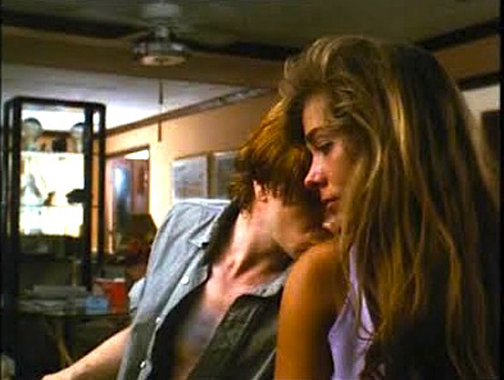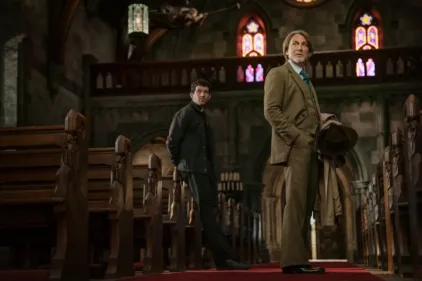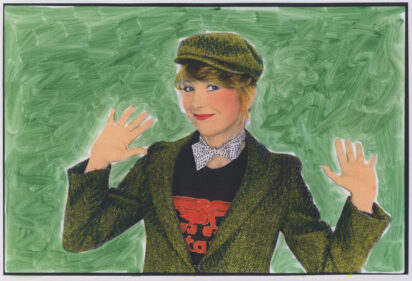TORONTO, Canada — “At the age of 16, I was in charge of myself,” Theresa Russell was saying. “I grew up kind of fast. My mother was 18 when I was born. She split with my father when I was 6, and married another man when I was about 7. My mother was about 25, my stepfather was about 26, I’m six or seven, I was looking at them and I knew they were just too young.
“Even at the time I was able to see they were not real equipped to deal with five kids. I was the oldest of five. My dad didn’t pay much child support, and there she was, with food stamps and five kids. I don’t wanna play the violin, but with things like that you grow up quick. And before long I started asking myself what gave her the right to tell me what I should do.”
This was a memory that had come out of nowhere. We had been talking about her movie career, about her own kids, about whether the Gary Oldman character in her new movie, “Track 29,” is really there, or only in her imagination. And then I asked her how she got started, how she got that juicy role in “The Last Tycoon” in 1976, when she was 17 and inexperienced, and she was telling me. It was just that the answer to my question began when she was born.
“Today, I adore my mother,” she said, still remembering. “Now I think it was shocking some of the things I put her through. I was a Valley girl, I hung out, and through a photographer friend. I met Peter Douglas, who was one of Kirk Douglas’s kids. He introduced me to Sam Spiegel.”
I am trying to imagine this, trying to picture the photographer, trying to imagine why he introduced Theresa Russell to Peter Douglas, trying to imagine why Peter Douglas, then a teenager, introduced her to Sam Spiegel, then well into his 70s and famed as the producer of “On the Waterfront” and “The Bridge on the River Kwai.” I look up at Russell, and the evidence is right there before me.
She is stunningly beautiful, with that wicked light in her eye that dares men to try their best, and warns them they will fail. She may have come out of the Valley, she may have come from food stamps and poverty, but she was obviously a trophy, and it is a strange thing about men: If they feel strongly enough about a beautiful woman they will want to help her, even to their own disadvantage. If Theresa Russell wanted, let’s say, to be a movie actress, then Sam Spiegel was a good man for her to know. We are not talking here about anything but the Hollywood facts of life.
“Sam loved to be seen with child-girls on his arm,” Russell said, stirring sugar into her coffee. “I was 16 years old and still living at home, and he took me to the Bistro and tried to stick his tongue down my throat. He thought he could buy and sell people, and what got to him was that when I came to see him I was always dropped off by my boy friend in his Rolls-Royce. I was going with a primal therapist at the time. Sam was producing this movie with Robert De Niro and Robert Mitchum, and he took me to Elia Kazan, the director, and asked him to use me as Mitchum’s daughter. So I had to work three times as hard to get the job, because of course Kazan didn’t give a shit about hiring Spiegel’s girl friend.”
She has it about right. We were sitting in a restaurant in Toronto on the day after “Track 29” had premiered at the Festival of Festivals, and I was trying to remember how Kazan told the story in A Life, his recently-published autobiography. After lunch I walked over to a book store and looked up Russell, Teresa in the index, and found:
“Sam suggested her. I had strong reservations, saw some values but more drawbacks. It was obvious to me, and later conversations with Theresa verified this, that Sam had, for a long time, tried to gentle her into his bed. I saw this without prejudice, because the truth is that most men of imagination and passion in the arts tend to use their power over young women–and young men–to this end. It’s life-loving and it’s inevitable. Sam, according to Miss Russell, had pursued her for many months unsuccessfully, and apparently he’d not given up. When I worked with her, as he requested, I liked her too, and came to believe she was certainly the best of a poor field and would bring something unanticipated to the role.”
Reading here between the lines (something that is not often necessary in Kazan’s frank memoir), I gather that Kazan wanted to sleep with her, too. Or maybe not. Liked her, anyway, and perhaps felt he had an opening since Spiegel was simultaneously trying to convince Kazan to hire another of his proteges.
Russell, in any event, did not find it life-loving to be squired by Spiegel, nor inevitable that she surrender to him. “I never had to do anything to be ashamed of, except that he did put his tongue down my throat,” she said. “But he never got inside my knickers.”
And so, at 17, Theresa Russell’s acting career was launched. If Kazan found her only the “best of a poor field,” reflect that she was straight from the Valley and had never done a day’s acting in her life. Completely inexperienced but with instinctive poise and screen presence, she held her own in the picture and has since developed into one of the most interesting actresses of her generation.
“I was not a bimbo,” she said, drawing the moral of the Spiegel episode. “Sam wanted me to sign this contract putting me under his control until 1985. This was 1976. I called a lawyer. Sam was furious. He said he would see to it that I got no billing in the movie. And to this day, if you ever see any advertising for ‘The Last Tycoon,’ my name is in teentsy-weentsy type. I was completely left out of the publicity for the movie. He was unrelenting. I asked him, ‘If I sign your contract, what if I want to do some role in some other picture?’ He said, ‘You’ll have to come to my boat in the South of France.’ Yeah, and what happens then?”
She sighed. “It sounds racy and everything but I don’t regard it as being that bad. I’ve calmed down considerably and had time to put it in perspective. It is true that sleeping with someone does get you somewhere in Hollywood. But I never had to.”
The primal therapist occupied your time?
“He lived on a ranch. We had horses.”
If you think of Theresa Russell in the movies, chances are you think, not long afterwards, of sex. She has been married for almost a decade to Nicolas Roeg, a British director whose films are almost always about twisted, doomed relationships with fearsome secrets, and he has taken her through plots where many actresses would fear to venture. In “Bad Timing,” in “Eureka,” in “Insignificance” (where she played Marilyn Monroe during a long night with Joe DiMaggio, Joe McCarthy and Sigmund Freud), Roeg and Russell have created worlds where the characters live out their darkest nightmares. When Russell works apart from Roeg, as she did in the intriguing “Black Widow” (1987) opposite Debra Winger, you realize she has the potential to be a big mainstream star–but more on that in a moment.
Roeg and Russell have not had enormous success at the box office, and “Track 29,” their latest collaboration, is as weird and difficult as anything they have done. Based on an original screenplay by Dennis (“Pennies from Heaven“) Potter, it stars Russell as a lonely American housewife whose husband doesn’t have much time for her (he divides his attention between his model train collection, and a nurse who wears rubber and spanks him). The Russell character, traumatized by a rape at the fairgrounds when she was a teenager, desperately wants to have a son. Then one day a young man (played by the brilliant British actor Gary Oldman) hitches into town in a semi truck, and comes knocking at her psyche.
This strange youth seems to be lover, son, confidant, and torturer. He claims to be her child from that fairground coupling, and he is also obviously the man who raped her. Now he is willing to become her lover, and as they play out variations on all those possibilities, it becomes clear to the audience that he is not really there at all. Or perhaps he is.
“Did you like it?” Russell asked me.
“Well…”
“You didn’t like it. A lot of people don’t.”
“I’m not sure ‘like’ is the appropriate word,” I said. “This is not the kind of picture you like. I want to see it again, because I’m not sure exactly what happened, although I admired the movie a lot, because it wasn’t just trying to be a formula picture, it was challenging me to figure it out and make up my mind…”
I was blabbering. The fact is, “Track 29” is an intensely unlikeable movie, but a very good one, and a brave one in being such a weird journey into the mind of a deranged woman.
“Nick always uses the same quote,” Russell said. “He aims his film not where the audience is, but where he wants them to go. He thinks that everybody is always right there with him: ‘Why should I slow it down, why should I come to their level? I want to take them with me’.”
In the case of “Track 29,” people come out of the theater with puzzled looks on their faces. There are a couple of scenes which seem to indicate that the Oldham character is really there, in the flesh, and then many other scenes that suggest he exists only in Russell’s imagination. The first time we see him in the movie, he materializes out of thin air.
“But then people think he’s really there in the hamburger stand, when I meet him along with my friend,” Russell said. “They forget that later my friend says, ‘What guy in the hamburger stand?’ When we were actually filming the movie, I thought he was really supposed to be there. Of course that’s what I had to believe, to play with him in scenes. Later we kind of decided he was never there. It’s the kind of movie where you want to sit down afterwards and have some coffee and figure out what happened.”
“What do you think now?”
“It doesn’t matter to me. He’s there and he isn’t there. You can definitely see him. I don’t think you can say he’s never there.” A wicked smile. “Maybe…he’s just barely there.”
Russell said she finished “Track 29” last year, and then took some time off to be with her two young sons by Roeg, who are 2 and 5. “We said, let’s stay put for six months,” she said. “We try to schedule it so that we aren’t both working at the same time, unless it’s with one another. That way we’re together most of the time. It’s no secret why Hollywood marriages don’t work. You’re off on a location, away from your partner, you get so intimate with your fellow cast and crew members over a short time, and it’s real easy for that to carry over into the other world. That’s not good, unless you have an arrangement, that kind of thing. But I’m far too passionate for that. I’m not too cool when it comes to sharing my man.”
She does think, however, that the time might be right for going after some of the big roles. “I had my children in my 20s, now I’ve just passed 30, it’s time to make a more conscious effort, to work in more high-profile kinds of things. I’ve been in the movies so long, people think I’m much older. They think I’ve been around forever. I’m 31, and I’ve been in the movies 14 years, and I can walk down the street and not be recognized.
“‘Black Widow‘ was a step in the direction of something a little more commercial. But in Hollywood they say, Yeah, great, she does ‘Black Widow‘ and then she goes back and works with her husband. I’m not a jealous person, but you feel yourself getting frustrated when you bust your butt trying to do a film that means anything to you, and there are gals coming up who are in two minor hits and suddenly they’re on the A list. Even if all of my pictures haven’t been great at the box office-like ‘The Razor’s Edge‘ [with Bill Murray] for example, at least they are always a good effort.”
What would you like to do?
“I don’t always have to be in one kind of role. I’d like to do a Spielberg movie. Athletic stunts. I’d like to be a cowgirl. I know how to ride a horse. I could work in Europe all the time, but I’ve chosen not to. I’m from America. America? I’m from the Valley.”












